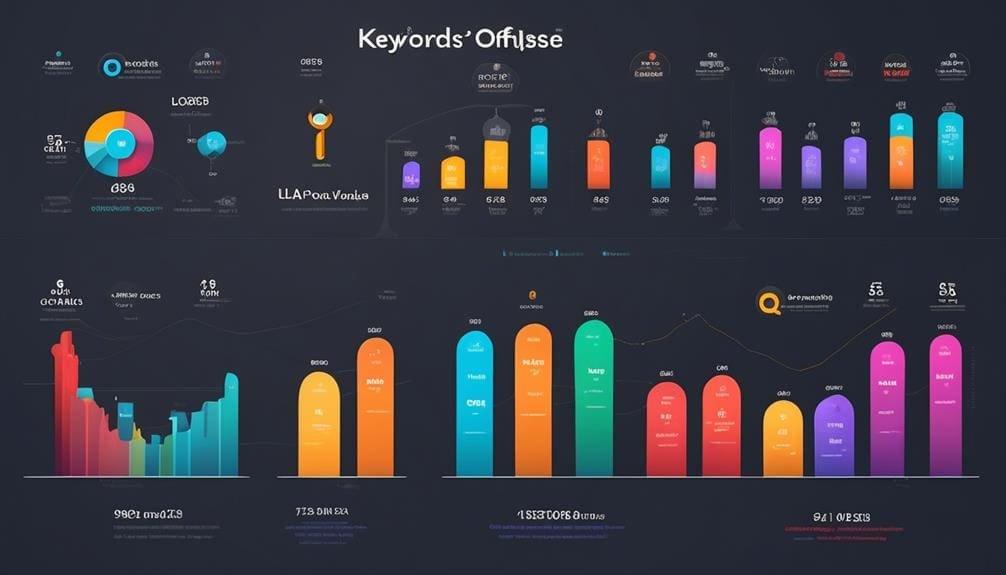5 Strategies for Analyzing Local Search Volume
January 18, 2024 | by Jacob Cavazos

Navigating the digital landscape is like finding a needle in a haystack to understand local search volume. We all want to attract the right customers, and that starts with leveraging the right strategies for analyzing local search volume. From distinguishing implicit versus explicit local keywords to utilizing powerful research tools, there are key tactics that can truly make a difference. But what are these strategies, and how can they be effectively implemented to drive tangible results? Join us as we uncover the five essential strategies for analyzing local search volume and unlocking the potential to reach your area’s right audience.
Implicit Vs. Explicit Local Keywords
When analyzing local search volume strategies, it’s crucial to differentiate between implicit and explicit local keywords to target the right audience and improve search visibility effectively. Understanding the distinction is pivotal for mastering local SEO. Although not location-specific, implicit local keywords convey local intent, influencing Google’s algorithms to provide relevant local search results. On the other hand, explicit local keywords directly include location terms, refining the search to a specific area.
To master local SEO, it’s imperative to grasp the nuances of local intent and the role of implicit and explicit local keywords in driving search visibility. Utilizing local SEO tools and conducting thorough keyword research is essential for identifying implicit and explicit local keywords. Businesses can refine their local keyword research by analyzing local search queries and user behavior to align with their target audience’s search patterns.
Implementing a strategic mix of implicit and explicit local keywords in SEO content can significantly enhance a website’s visibility in local search results. Mastery of local keyword research empowers businesses to cater to local intent effectively, boosting their overall search visibility and attracting relevant local traffic.
Utilizing Local Keyword Research Tools
Understanding the nuances of local intent and the impact of implicit and explicit local keywords in driving search visibility, we now focus on the practical application of local keyword research tools. When it comes to targeting local customers effectively, it’s crucial to employ the right tools to identify relevant keywords that resonate with the local audience. By using local keyword research tools such as Google Keyword Planner, Google Trends, Moz Local Market Analytics, and SEMrush’s Local Keyword Research Tool, businesses can gain valuable insights into search volumes, competition levels, and tailored keyword suggestions for specific locations. Additionally, engaging with existing customers through surveys and feedback, participating in regional online forums, and analyzing customer reviews can provide further understanding of the language and location-specific terms used by the target audience. Below is a comparison table of popular local keyword research tools:
| Local Keyword Research Tools | Main Features |
|---|---|
| Google Keyword Planner | Search volume data, competition levels, and keyword suggestions |
| Google Trends | Trend analysis and seasonality of keywords |
| Moz Local Market Analytics | Location-specific keyword opportunities and competitor analysis |
| SEMrush’s Local Keyword Research Tool | Local search volume data and competitor analysis |
Analyzing Competitor Keyword Strategies

By delving into competitors’ rankings and utilizing tools like Semrush’s Domain Overview and Keyword Gap, businesses can gain valuable insights into effective keyword strategies and uncover potential keywords to target. Analyzing competitors’ keyword strategies is crucial for refining our local SEO keyword research and improving our performance in local search results. Tools like Semrush’s Keyword Gap can help us identify the keywords our competitors are ranking for but are not, allowing us to capitalize on these opportunities. The Google Keyword Planner can provide valuable insights into the search volume and competition for specific keywords, helping us prioritize our efforts. Moreover, optimizing the Google Business Profile (GBP) for local keywords and tracking rankings using tools like Semrush can enhance our visibility on Google Maps and local search results. By understanding what keywords our competitors are targeting and ranking for, we can refine our regional SEO strategy to ensure that search engines understand the relevance of our content for local searches. This approach can give us a competitive edge in the local search landscape.
Assessing Keyword Search Volume and Competition
To refine our local SEO strategy and gain a competitive edge in the local search landscape, shifting focus towards assessing the keyword search volume and competition is imperative. Utilizing tools like SEMrush’s Keyword Magic Tool provides valuable insights into search queries and relevant data, enabling us to prioritize local keywords with high search volumes. Targeting low-hanging fruit keywords for optimization can significantly enhance our business’s online visibility.
Analyzing competitors’ rankings is also crucial in identifying additional keywords to target for local SEO. By filtering and saving relevant keywords using SEMrush’s Keyword Manager or a spreadsheet, we can effectively exclude competitors’ brand names and focus on keywords that align with our business goals.
Furthermore, optimizing our Google Business Profile for local keywords and categories is pivotal in improving local search visibility. Tracking rankings using SEMrush’s Listing Management tool allows us to monitor the effectiveness of our local SEO efforts and make data-driven decisions to enhance our online presence.
Tracking and Analyzing Local Keyword Performance

Tracking and analyzing local keyword performance provides invaluable insights into the effectiveness of our SEO efforts and empowers us to make informed decisions for optimizing our online visibility. By focusing on specific geographic areas with local keyword research, we can effectively tailor our content and keyword strategy to attract local customers. To track local keyword performance, we utilize tools to analyze local search volume and monitor our local search rankings. Our approach involves using local keywords relevant to our target local area, including relevant keywords to enhance our online visibility within the local market.
By tracking local keyword performance, we can identify which keywords drive the most traffic and conversions from our local area. This data-driven approach allows us to refine our keyword strategy continually and prioritize the most effective keywords for targeting local customers. By regularly analyzing local keyword performance, we can adapt our content and SEO strategies to maintain and improve our local search rankings, ensuring that our online presence remains optimized for local search queries.
Frequently Asked Questions
How Do You Analyse Search Volume?
We analyze search volume by tracking search trends, conducting competitor analysis, understanding user intent, utilizing long tail keywords, considering local demographics, accounting for seasonal variations, adapting to search engine algorithms, and targeting location-based and geographical variations.
How Do I Find Local Search Volume of Keywords?
We find local search volume of keywords by leveraging search volume tools like Semrush’s Keyword Magic Tool for geographic targeting. This allows us to perform regional SEO, location-based marketing, and analyze local keyword trends.
What Strategies Are Recommended When Conducting Keyword Searches?
When conducting keyword research and analysis, it’s crucial to consider search trends, patterns, and competitor comparisons. Prioritizing long-tail keywords based on user intent and optimizing for geographic targeting and mobile search can significantly impact local visibility and engagement.
How Do I Improve Local Search Visibility?
Improving local search visibility involves optimizing local listings, targeting geographic keywords, and leveraging online reviews. Utilize Google My Business for neighborhood targeting and city-specific content. Analyze local competition and prioritize business directories for effective local SEO.
RELATED POSTS
View all



